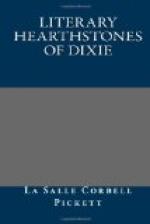My impression of Father Ryan was of being in the presence of a great power—something indefinable and indescribable, but invincibly sure. He was of medium height, and his massive head seemed to bend by its own weight, giving him a somewhat stooped appearance. His hair, brown, with sunny glints touching it to gold, was brushed back from his wide, high forehead, falling in curls around his pale face and over his shoulders. I recall with especial distinctness the dimple in his chin, a characteristic of many who have been very near to me, for which reason it attracted my attention when appearing in a face new to me. His eyes were his greatest beauty,—Irish blue, under gracefully arched brows, and luminous with the sunshine that has sparkled in the eyes of his race in all the generations, caught by looking skyward for a light that dawned not upon earth. His expression was sad, and the beautiful smile that illumined his face, radiating compassion, kindness, gentleness and the humor of the Kelt, made me think of a brilliant noontide sun shining across a grave.
We discussed Folk Lore, and he said that some of the best lessons were taught in the Folk Lore of the plantation negro. One of his sermons was on “Obstinacy,” illustrated by a story told him by an old colored man:
“Marser, does you know de reason dat de crab walks back’ards? Well, hit’s dis away: when de Lord wuz mekin’ uv de fishes He meked de diffunt parts en put ’em in piles, de legs in one pile, de fins in anudder, en de haids in anudder. Do’ de crab wan’t no fish, He meked hit at de same time. Afterwards He put ’em tergedder en breaved inter ‘em de bref er life. He stuck all de fishes’ haids on, but de crab wuz obstreperous en he say, ‘Gib me my haid; I gwine put hit on myse’f.’ De Lord argufied wid him but de crab wouldn’ listen, en he say he gwine put hit on. So de Lord gin him his haid en ’course he put hit on back’ards. Den he went ter de Lord en ax’ Him ter put hit straight, but de Lord wouldn’ do hit, en He tole him he mus’ go back’ards all his life fer his obstinacy. En so ’tis wid some people.”
[Illustration: FATHER RYAN From the portrait in Murphy’s Hotel, Richmond, Virginia]
Father Ryan told me that one of the greatest obstacles with which he had to contend in his dealings with people was the lack of ethic sensitiveness which rendered them oblivious to the harm of deviations from principle which seemed not to result in great evil. People who would not steal articles of value did not hesitate to cheat in car-fare, taking the view that the company got enough out of the public without their small contribution. He said, “They are like two very religious old ladies who, driving through a toll-gate, asked the keeper the rate. Being newly appointed, he looked into his book and read so much for a man and a horse. The woman who was driving whipped up the horse, calling out, ’G’lang, Sally, we goes free. We are two old maids and a mare.’ On they went without paying.”




